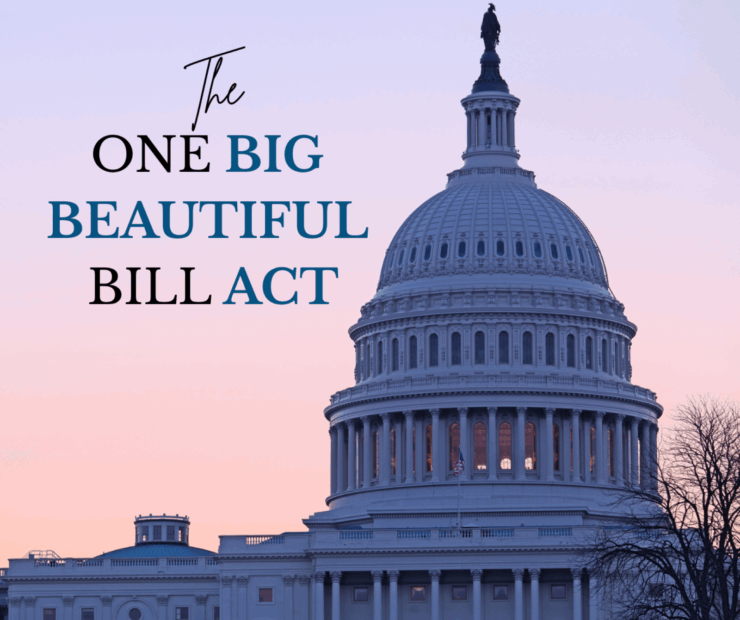The One Big Beautiful Bill Act: What Retirees Need to Know
August 18, 2025
On July 4th, 2025, Congress passed the One Big Beautiful Bill Act (OBBBA), a comprehensive piece of tax legislation that includes the permanent extension of key provisions from the 2017 Tax Cuts and Jobs Act (TCJA), along with new tax relief measures and adjustments to some retiree-related policies.
While the legislation covers a wide range of issues, retirees stand to benefit from several key provisions, including an increased standard deduction, the extension of current income tax rates, higher state and local tax (SALT) deduction limits, and an expanded estate and gift tax exclusion.
Revised Standard Deduction: Enhanced Amounts and Senior-Specific Adjustments
A cornerstone of the new OBBBA legislation is the enhanced standard deduction, now permanently set at $15,750 for single filers and $31,500 for married couples filing jointly, with annual inflation adjustments. This is a notable increase from the 2024 amounts of $14,600 and $29,200, respectively, and is intended to simplify tax filing for most households.
In addition, the Act introduces a temporary “Senior Bonus Deduction,” available from 2025 through 2028. This provides an extra $6,000 deduction per person for taxpayers aged 65 and older, with a full $12,000 available to married couples where both spouses qualify. This bonus is in addition to the existing age-based standard deduction add-ons (currently $1,600–$2,000 per person based on filing status).
That adds up to a substantial potential deduction, significantly reducing taxable income and helping retirees retain more of their hard-earned retirement savings. However, the Senior Bonus Deduction begins to be phased out for taxpayers with higher incomes, specifically for single filers with modified adjusted gross income (MAGI) over $75,000 and for married couples filing jointly with MAGI over $150,000.
Tax Brackets Made Permanent: What It Means for Retirement and Income Planning
One of the most impactful provisions in the One Big Beautiful Bill Act (OBBBA) is the permanent extension of the individual income tax rates originally enacted under the 2017 Tax Cuts and Jobs Act (TCJA).
The TCJA lowered marginal tax rates across the board, reducing the top rate from 39.6% to 37%, and compressing the 15% and 25% brackets into more favorable 12% and 22% brackets. These lower rates were scheduled to sunset after 2025, creating uncertainty for retirees who depend on relatively stable income sources such as pensions, annuities, and required minimum distributions (RMDs) from retirement accounts.
With OBBBA, these tax brackets are now permanently written into law. While future legislation could still change rates, they will no longer automatically revert to pre-TCJA levels. This eliminates a major source of planning ambiguity and gives retirees and their advisors a clearer, more reliable foundation for long-term tax strategy.
This stability opens the door to more effective implementation of tax planning tactics like Roth conversions, Qualified Charitable Distributions (QCDs), and tax-efficient withdrawal strategies. Retaining the lower brackets means more income can be kept in favorable tax tiers, which is especially valuable for retirees managing withdrawals from both taxable and tax-deferred accounts.
In short, locking in the current tax brackets enhances retirees’ ability to manage taxable income, reduce lifetime tax liability, preserve retirement assets, and maintain better control over RMDs and Medicare IRMAA thresholds.
Expanded SALT Deduction: A Break for Taxpayers in High-Cost Areas
The One Big Beautiful Bill Act (OBBBA) delivers meaningful relief to taxpayers in high-tax states by significantly increasing the cap on the State and Local Tax (SALT) deduction. Previously capped at $10,000 under the Tax Cuts and Jobs Act, the SALT deduction disproportionately affected residents of states with high property taxes or substantial state income taxes, like California, New York, New Jersey, and Illinois.
Beginning in tax year 2025, the SALT cap is raised to $40,000 and will be adjusted for inflation by 1% annually through 2029. This increased cap applies to both individual and joint filers. However, the benefit phases out for taxpayers with modified adjusted gross income (MAGI) over $500,000, limiting its reach for higher-income households.
This higher deduction threshold could translate into thousands of dollars in additional federal tax savings for retirees who continue to itemize, particularly those with significant property tax payments, state income tax liabilities, or meaningful charitable contributions. It also narrows the gap between itemizing and taking the standard deduction, potentially making itemization a more attractive strategy once again.
In short, the expanded SALT deduction gives retirees in high-tax areas more room to optimize their tax strategy and reduce overall taxable income, especially when paired with other itemizable expenses like mortgage interest and charitable giving.
Estate and Gift Tax Exemption Increased: A Strategic Opportunity for High-Net-Worth Families
One of the most anticipated provisions in the new legislation is the expansion and permanent extension of the federal estate and gift tax exclusion. This exclusion represents the amount an individual can transfer, either during their lifetime through gifts or at death via their estate, without incurring federal estate or gift taxes. Under prior law, the exclusion was set to be reduced by half after 2025, reverting to pre-TCJA levels. However, beginning in 2026, the exclusion will increase to $15 million per individual, or $30 million for married couples, and will be indexed for inflation moving forward.
This change creates a powerful opportunity for retirees and high-net-worth individuals to engage in strategic legacy planning. With a higher threshold in place, more wealth can be transferred tax-free, whether through lifetime gifting, funding irrevocable trusts, or incorporating charitable giving strategies. The expanded exclusion provides greater flexibility and certainty for structuring wealth transfers to align with long-term family and philanthropic goals.
Final Thoughts and Planning Considerations
While this article highlights some of the tax provisions most relevant to retirees, the OBBBA includes several additional measures that could impact households across various ages and income levels. Some other key provisions include:
- A new deduction for auto loan interest
- A tax deduction for overtime pay and tip income
- An expanded Child Tax Credit
- The introduction of TRUMP Accounts
These updates present new opportunities for tax planning. Whether you’re managing retirement income, considering Roth conversions, or preparing for wealth transfer, the changes introduced by this legislation may warrant a fresh look at your strategy.
As always, it’s wise to consult with a qualified tax advisor or financial planner to determine how these new rules apply to your personal situation and to ensure you’re taking full advantage of the new law’s planning opportunities.
__
Williams Asset Management and Commonwealth Financial Network® do not provide legal or tax advice. This material has been provided for general informational purposes only and does not constitute either investment or tax advice. Although we go to great lengths to make sure our information is accurate and useful, we recommend you consult a financial advisor or tax preparer.


